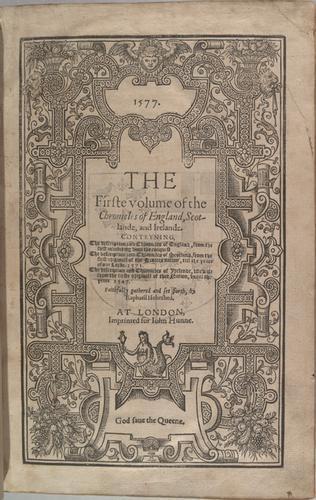 | Raphael Holinshed
The First volume of the Chronicles of England, Scotlande, and Irelande
London: Imprinted for John Hunne, 1577 | Shakespeare used the second, unillustrated, edition of Holinshed’s Chronicles (1587) extensively in writing Macbeth, King Lear, and Cymbeline, as well as in writing a third of the history plays (including Henry IV, Parts 1 and 2, Henry V, Henry VIII, and Richard II) two tragedies (King Lear and Macbeth) and a romance (Cymbeline). Macbeth is shown here receiving “The prophesie of three women supposing to be the wierd sisters or feiries.” This copy was owned by Robert Hoe.
Bequest of Mollie Harris Samuels |
|